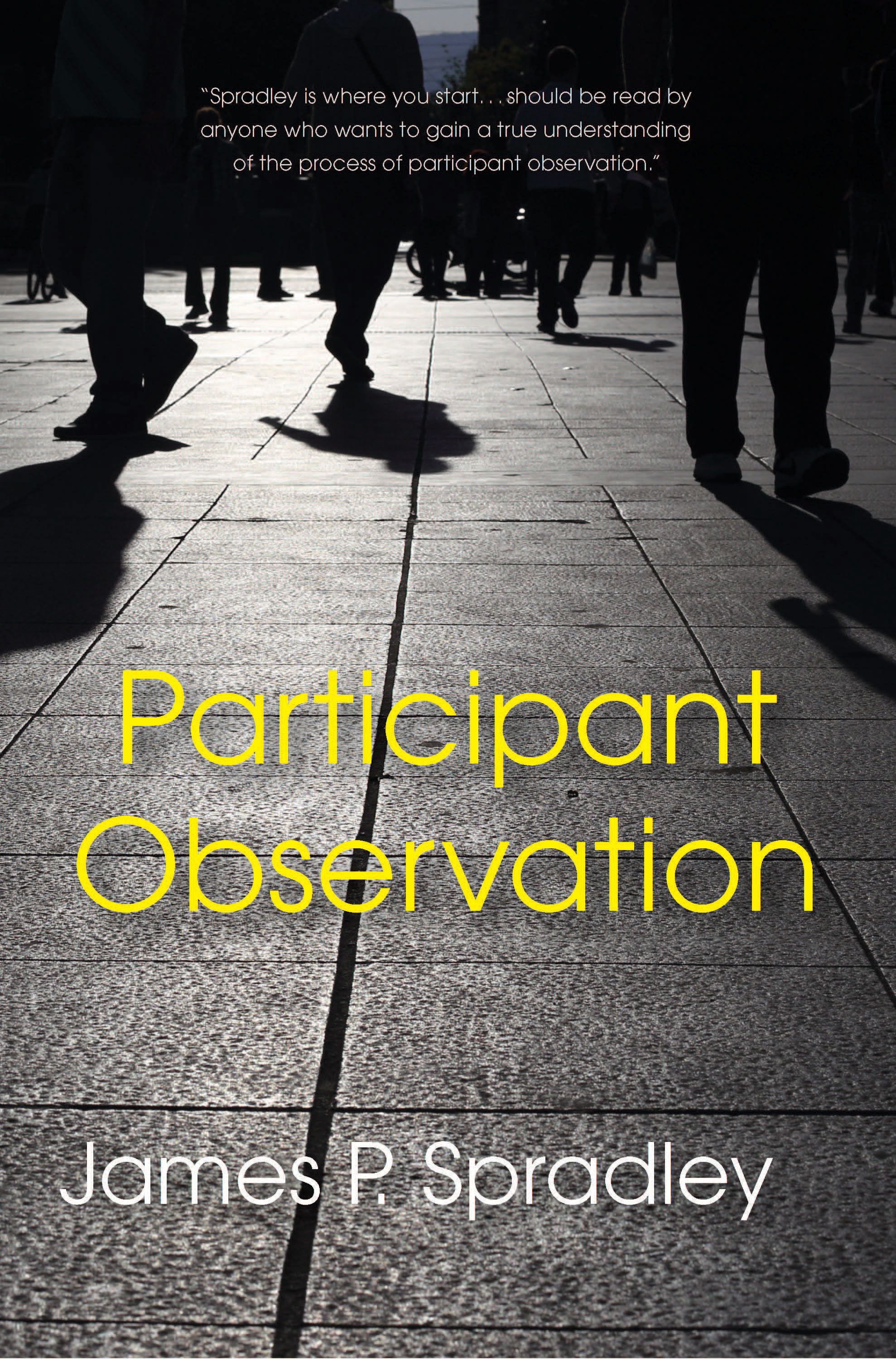“Great book that guides students through the research process from start to finish.” — David Rutledge, New Mexico State University
“To deliver powerful insights about the people, organizations, and cultures we’re studying with digital ethnography, we need a framework to ensure we don’t miss vital pieces of the narrative. While many ethnographic frameworks exist, the parent framework in ethnography is James P. Spradley’s 9 Dimensions of Descriptive Observation.” — Christopher S. Penn, Vice President of Marketing Technology, Shift Communications
“Like its companion, The Ethnographic Interview, Participant Observation is a valuable, step-by-step guide to entering a new community. Although an older book, it still is relevant for guiding students in engaging with a community they want to learn more about. Thank you for reissuing it!” — Lori Gardner, Trinity Western University

195 pages, $28.95 list
1-4786-3208-9
978-1-4786-3208-5
© 1980
paperback
eBook availability
Similar Titles
Participant Observation
Spradley should be read by anyone who wants to gain a true understanding of the process of participant observation. This text is a follow-up to his ethnographic research handbook, The Ethnographic Interview, and guides readers through the technique of participant observation to research ethnography and culture. Spradley shows how to analyze collected data and to write an ethnography. The appendices include research questions and writing tasks.
James P. Spradley (1933–1982), a professor of anthropology at Macalester College, wrote or edited twenty books on ethnography and qualitative research in twelve years, including The Cultural Experience: Ethnography in Complex Society (with McCurdy; 2/E with Shandy), The Ethnographic Interview, Participant Observation, The Cocktail Waitress: Woman’s Work in a Man’s World (with Mann), and You Owe Yourself a Drunk: An Ethnography of Urban Nomads, all available from Waveland Press. He was among the first cultural anthropologists to study modern U.S. life and to apply distinctly anthropological concepts and methods to address real-world problems like occupational stress, deafness, and homelessness.
James P. Spradley (1933–1982), a professor of anthropology at Macalester College, wrote or edited twenty books on ethnography and qualitative research in twelve years, including The Cultural Experience: Ethnography in Complex Society (with McCurdy; 2/E with Shandy), The Ethnographic Interview, Participant Observation, The Cocktail Waitress: Woman’s Work in a Man’s World (with Mann), and You Owe Yourself a Drunk: An Ethnography of Urban Nomads, all available from Waveland Press. He was among the first cultural anthropologists to study modern U.S. life and to apply distinctly anthropological concepts and methods to address real-world problems like occupational stress, deafness, and homelessness.
Reactions
Part One: ETHNOGRAPHY AND CULTURE
1. Ethnography and Culture
2. Ethnography for What?
3. The Ethnographic Research Cycle
Part Two: THE DEVELOPMENTAL RESEARCH SEQUENCE
Step 1. Locating a Social Situation
Step 2. Doing Participant Observation
Step 3. Making an Ethnographic Record
Step 4. Making Descriptive Observations
Step 5. Making a Domain Analysis
Step 6. Making Focused Observations
Step 7. Making a Taxonomic Analysis
Step 8. Making Selected Observations
Step 9. Making a Componential Analysis
Step 10. Discovering Cultural Themes
Step 11. Taking a Cultural Inventory
Step 12. Writing an Ethnography
Appendix A: The Developmental Research Sequence Method
Appendix B: Developmental Research Sequence Writing Tasks
1. Ethnography and Culture
2. Ethnography for What?
3. The Ethnographic Research Cycle
Part Two: THE DEVELOPMENTAL RESEARCH SEQUENCE
Step 1. Locating a Social Situation
Step 2. Doing Participant Observation
Step 3. Making an Ethnographic Record
Step 4. Making Descriptive Observations
Step 5. Making a Domain Analysis
Step 6. Making Focused Observations
Step 7. Making a Taxonomic Analysis
Step 8. Making Selected Observations
Step 9. Making a Componential Analysis
Step 10. Discovering Cultural Themes
Step 11. Taking a Cultural Inventory
Step 12. Writing an Ethnography
Appendix A: The Developmental Research Sequence Method
Appendix B: Developmental Research Sequence Writing Tasks